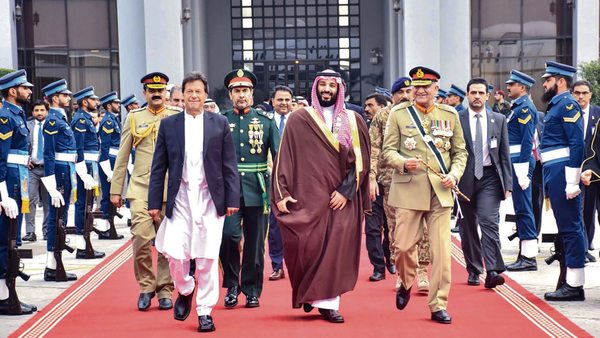
It seems the Pakistanis live with the most confused state of mind in the world. Most concepts of the modern simple political science are either misinterpreted or taught to the general public in a manner so as to confuse them. For instance, let’s take the concept of ‘state’– the most common topic of political science. We understand ‘state’ differently that the rest of the world, eg. the Pakistani academia, bureaucracy, political elite and even journalists often frequently spread misconception regarding ‘state’.
Did you not hear that the ‘state’ has decided to take stern action against TLP (Tehreek-e-Labbaik Pakistan)? The ‘state’ has changed her narrative towards terrorists? The ‘state’ has entered into an agreement with TTP? Even, Nawaz Sharif, the three times Prime Minister of Pakistan makes a statement that “there is a state above the state in Pakistan”. There are questions like these and many more, where the word ‘state’ is often reciprocally interchanged with the various authorities such as police, army and intelligence agencies.
Let’s start with the basic definition of a state. A populace that lives in a specific territory, is governed by an authority (government) having internal and external sovereignty is called a state. Modern scholars also include ‘international acknowledgment’ as one of the ingredients of state. The state has three main branches/pillars for the dispensation of her work. These are executive (government), parliament and the judiciary. The executive has various subordinate institutions to manage its affairs, eg. police, intelligence services, army, local administration and so on.
So how does a state operate? The basic function of a state is to enforce the collective wisdom of the society. And how do we gauge the collective wisdom? This ‘collective wisdom’ could only be enforced by the chosen representatives of the masses. For that purpose, general elections are held after every five years. The people bestow their trust to their elected members of parliament to enforce collective wisdom by making laws as per their aspirations. These laws and policies are enforced by the government.
The government acts only as a representative of the parliament likewise parliament is a representative of the people. The government needs validation of all her acts by the parliament, otherwise, it stands to disqualify.
Now let’s come back to the misconception in Pakistan.
We often come across phrases like the Pakistan government has decided to indulge in talks with TTP etc.? The prime question is to whom do we consider a government? Whether these talks are arranged/initiated by the official representatives that are ‘elected ministers’ or have been initiated by the Pakistan Army chief and DG-ISI? In Pakistan, it is an open secret that the talks/dialogues with TTP, TLP, terrorists etc. are arranged and conducted by the Pakistan Army and their security agencies.
Neither these agreements are ever presented in Pakistan’s parliament for a debate nor parliament has the power to summon the draft of such agreement. If the agreement is conducted by the Pakistan Army and ISI then how could it be called that Pakistani ‘state’ has done something? Simply because the army, police, ISI etc. are only subordinate institutions that could never be considered as a state. They are state institutions rather be a state.
Any decision taken by or any agreement conducted by these institutions has not been attained the same sanctity as taken by the government and acknowledged by the parliament. The reason behind such rationale is that the state shows her intention only through the government. Furthermore, when decisions are taken other than the government, it eventually undermines democracy. Ultimately, the state losses its respect in people’s hearts and resultantly its constituent units/ provinces dismember themselves from it. The process ends up with the annihilation of state. Bangladesh (East Pakistan) is an example.
Our conduct has badly destroyed our state image to the world. Such disfigurement may cause us an irreparable loss for the rest of our future. The world, unfortunately, has mi-conceptualized her conduct towards Pakistan too. For instance, the international forums, instead of engaging in a dialogue with the state (government) of Pakistan, call upon the Pakistan Army chief for all negotiations. Look at the recent history. The meeting with the Crown Prince of Saudi Arabia, the meeting with American officials, the finalization of American withdrawal from Afghanistan and support of the army for such withdrawal, the support of the Afghan government, dealing with China over CPEC etc. Even now, the business community inside the country seeks some guarantees for economical stability from the Pakistan Army chief. The list continues and questions arise!
Whether these events have the approval of Pakistan’s parliament? Whether they are discussed and approved ? Whether the general public is bound to honour them when they didn’t get assent from the collective wisdom?
What do these incidents suggest? Who represents the real state in Pakistan?
The people have respect for a state only. They may have some affiliations with various departments/institutions. They may even sacrifice their lives for these institutions but the only binding force which ties them in a relationship is the state, not an institution. Because the institution may collapse but the state sustains. In order to keep a state strengthened, sustainable and inevitable the state needs to first deconstruct and then reconstruct the concepts that would have an alignment with the world.
The misconception could be avoided by the encouragement of a grand debate across Pakistan. Modern scholars may initiate some steps for the fixation of such misconceptions. Furthermore, the government should ought to restore her authority by honouring only those steps taken by her, which are ratified by the Pakistan parliament and those that are truly represented by the ‘collective wisdom’ of the populace.
